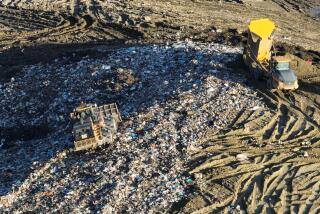L.A. Will Look at European Trash-to-Energy Plants
- Share via
Los Angeles City Councilman Greig Smith is leading a delegation on a seven-city tour of Europe starting Sunday to look at trash-to-energy plants and other alternatives to landfills.
Smith said the nine-day trip involving five city officials was necessary, but a taxpayer-rights advocate said something smells.
“You notice it’s Europe. They aren’t going to Bakersfield,” said Jon Coupal, president of the Howard Jarvis Taxpayers Assn. “This stuff just smacks of a junket, and it’s par for the course for the city of Los Angeles.”
Not so, said Smith, who estimated the trip to Spain, Germany and Belgium would cost the city about $22,500.
Los Angeles is at a critical juncture where it must decide soon whether to continue to dump all of its trash in the Sunshine Canyon Landfill in Granada Hills, or find alternative disposal methods, Smith said. The city also has recently committed to finding ways to generate electricity other than burning heavily polluting coal.
“We are going to be looking at new technology used more in Europe than in the United States to divert trash from landfills with useful alternatives, in most cases for power production,” Smith said.
About 100 tons of the 4,000 tons of garbage generated daily by Los Angeles is shipped to a plant in Long Beach that burns it to produce electricity.
But Smith said he was more interested in new, cleaner technologies, including anaerobic digestion.
Anaerobic plants planned for Cal State Channel Islands and UC Davis will use organic waste and waste from food processing, which generate methane that will turn turbines and create electricity, according to Scott Archibald, the chief executive of Onsite Power Systems, which is overseeing the projects.
Fernando Berton of the state Integrated Waste Management Board said he was not aware of any digestion plant using household trash in California, or even in the United States.
The technology has been used for years in Europe, where many areas have banned landfills, Berton said.
One of the largest, most advanced anaerobic digestion plants in the world is near Barcelona, Spain, which the delegation will visit before seeing other plants in Germany and Belgium, Smith said.
Accompanying Smith will be two of his staff members, two officials with the city Sanitation Bureau and an official with the firm URS Co., which has been hired to help explore alternative technologies.
More to Read
Sign up for Essential California
The most important California stories and recommendations in your inbox every morning.
You may occasionally receive promotional content from the Los Angeles Times.














